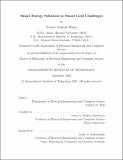| dc.contributor.advisor | James L. Kirtley. | en_US |
| dc.contributor.author | Wang, Xuntuo(Nelson Xuntuo) | en_US |
| dc.contributor.other | Massachusetts Institute of Technology. Department of Electrical Engineering and Computer Science. | en_US |
| dc.date.accessioned | 2021-01-06T20:18:00Z | |
| dc.date.available | 2021-01-06T20:18:00Z | |
| dc.date.copyright | 2020 | en_US |
| dc.date.issued | 2020 | en_US |
| dc.identifier.uri | https://hdl.handle.net/1721.1/129312 | |
| dc.description | Thesis: Ph. D., Massachusetts Institute of Technology, Department of Electrical Engineering and Computer Science, September, 2020 | en_US |
| dc.description | Cataloged from student-submitted PDF of thesis. | en_US |
| dc.description | Includes bibliographical references (pages 181-191). | en_US |
| dc.description.abstract | The smart micro-grid is an energy network, and researchers have spent decades working on technology development. Among most existing solutions, they focus on dynamic operation and stability issues, however the smart grid still exhibit these challenges: the electric energy network has complicated system structure, high cost, and low energy efficiency in operation. In light of popular applications, this thesis analyzes the smart grid at the local (residential) level into two categories: high-power network - electric network dealing with electric vehicles (EVs), and low-power network - electronics network dealing with smart mobile phones. This thesis proposes a centralization approach to tackle these addressed problems. On the electric network side, current micro-grid systems with high penetration of electric vehicles (EVs) have a bulky and low energy efficiency system to connect solar panels and the utility with EV batteries. This work proposes a smart and efficient EV charger to be the hub to make the system more energy efficient; On the electronics network side, multi-use application requires multiple power converters, this work proposes a centralized wireless power transfer system to be the hub charging multiple phones and low power devices using the grid power. Data mining is applied to the operation analysis of the electric network on economics where optimization strategies are discussed. | en_US |
| dc.description.statementofresponsibility | by Nelson Xuntuo Wang. | en_US |
| dc.format.extent | 191 pages | en_US |
| dc.language.iso | eng | en_US |
| dc.publisher | Massachusetts Institute of Technology | en_US |
| dc.rights | MIT theses may be protected by copyright. Please reuse MIT thesis content according to the MIT Libraries Permissions Policy, which is available through the URL provided. | en_US |
| dc.rights.uri | http://dspace.mit.edu/handle/1721.1/7582 | en_US |
| dc.subject | Electrical Engineering and Computer Science. | en_US |
| dc.title | Smart energy solutions to smart grid challenges | en_US |
| dc.type | Thesis | en_US |
| dc.description.degree | Ph. D. | en_US |
| dc.contributor.department | Massachusetts Institute of Technology. Department of Electrical Engineering and Computer Science | en_US |
| dc.identifier.oclc | 1227780758 | en_US |
| dc.description.collection | Ph.D. Massachusetts Institute of Technology, Department of Electrical Engineering and Computer Science | en_US |
| dspace.imported | 2021-01-06T20:18:00Z | en_US |
| mit.thesis.degree | Doctoral | en_US |
| mit.thesis.department | EECS | en_US |
